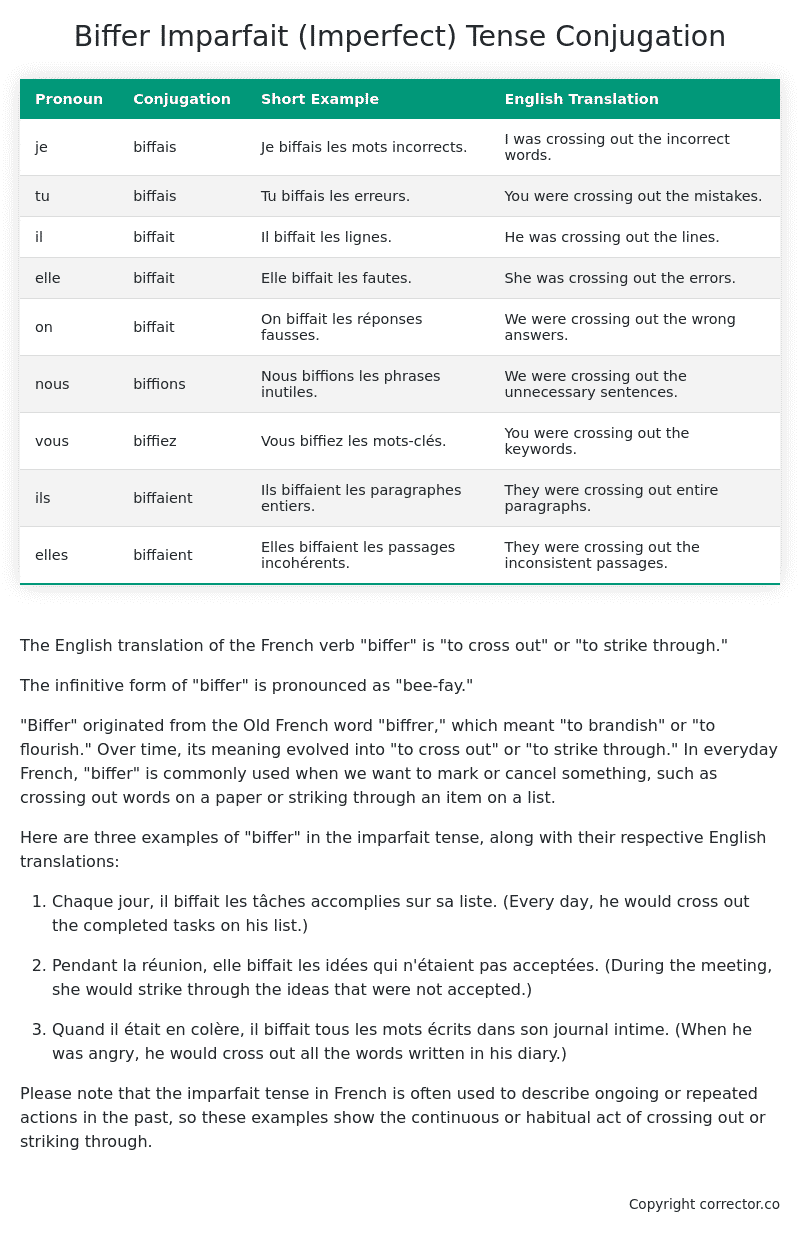Imparfait (Imperfect) Tense Conjugation of the French Verb biffer
Introduction to the verb biffer
The English translation of the French verb “biffer” is “to cross out” or “to strike through.”
The infinitive form of “biffer” is pronounced as “bee-fay.”
“Biffer” originated from the Old French word “biffrer,” which meant “to brandish” or “to flourish.” Over time, its meaning evolved into “to cross out” or “to strike through.” In everyday French, “biffer” is commonly used when we want to mark or cancel something, such as crossing out words on a paper or striking through an item on a list.
Here are three examples of “biffer” in the imparfait tense, along with their respective English translations:
-
Chaque jour, il biffait les tâches accomplies sur sa liste.
(Every day, he would cross out the completed tasks on his list.) -
Pendant la réunion, elle biffait les idées qui n’étaient pas acceptées.
(During the meeting, she would strike through the ideas that were not accepted.) -
Quand il était en colère, il biffait tous les mots écrits dans son journal intime.
(When he was angry, he would cross out all the words written in his diary.)
Please note that the imparfait tense in French is often used to describe ongoing or repeated actions in the past, so these examples show the continuous or habitual act of crossing out or striking through.
Table of the Imparfait (Imperfect) Tense Conjugation of biffer
| Pronoun | Conjugation | Short Example | English Translation |
|---|---|---|---|
| je | biffais | Je biffais les mots incorrects. | I was crossing out the incorrect words. |
| tu | biffais | Tu biffais les erreurs. | You were crossing out the mistakes. |
| il | biffait | Il biffait les lignes. | He was crossing out the lines. |
| elle | biffait | Elle biffait les fautes. | She was crossing out the errors. |
| on | biffait | On biffait les réponses fausses. | We were crossing out the wrong answers. |
| nous | biffions | Nous biffions les phrases inutiles. | We were crossing out the unnecessary sentences. |
| vous | biffiez | Vous biffiez les mots-clés. | You were crossing out the keywords. |
| ils | biffaient | Ils biffaient les paragraphes entiers. | They were crossing out entire paragraphs. |
| elles | biffaient | Elles biffaient les passages incohérents. | They were crossing out the inconsistent passages. |
Other Conjugations for Biffer.
Le Present (Present Tense) Conjugation of the French Verb biffer
Imparfait (Imperfect) Tense Conjugation of the French Verb biffer (You’re reading it right now!)
Passé Simple (Simple Past) Tense Conjugation of the French Verb biffer
Passé Composé (Present Perfect) Tense Conjugation of the French Verb biffer
Futur Simple (Simple Future) Tense Conjugation of the French Verb biffer
Futur Proche (Near Future) Tense Conjugation of the French Verb biffer
Plus-que-parfait (Pluperfect) Tense Conjugation of the French Verb biffer
Passé Antérieur (Past Anterior) Tense Conjugation of the French Verb biffer
Futur Antérieur (Future Anterior) Tense Conjugation of the French Verb biffer
Subjonctif Présent (Subjunctive Present) Tense Conjugation of the French Verb biffer
Subjonctif Passé (Subjunctive Past) Tense Conjugation of the French Verb biffer
Subjonctif Imparfait (Subjunctive Imperfect) Tense Conjugation of the French Verb biffer
Subjonctif Plus-que-parfait (Subjunctive Pluperfect) Tense Conjugation of the French Verb biffer
Conditionnel Présent (Conditional Present) Tense Conjugation of the French Verb biffer
Conditionnel Passé (Conditional Past) Tense Conjugation of the French Verb biffer
Conditionnel Passé II (Conditional Past II) Tense Conjugation of the French Verb biffer
L’impératif Présent (Imperative Present) Tense Conjugation of the French Verb biffer
L’impératif Passé (Imperative Past) Tense Conjugation of the French Verb biffer
L’infinitif Présent (Infinitive Present) Tense Conjugation of the French Verb biffer
L’infinitif Passé (Infinitive Past) Tense Conjugation of the French Verb biffer
Le Participe Présent (Present Participle) Tense Conjugation of the French Verb biffer
Le Participe Passé (Past Participle) Tense Conjugation of the French Verb biffer
Struggling with French verbs or the language in general? Why not use our free French Grammar Checker – no registration required!
Get a FREE Download Study Sheet of this Conjugation 🔥
Simply right click the image below, click “save image” and get your free reference for the biffer imparfait tense conjugation!

Biffer – About the French Imparfait Tense
NOTE: To take a deep dive into all the French tenses then see our article on Mastering French Tense Conjugation.
Formation of the Imparfait Tense
For regular -er verbs:
For regular -ir verbs
For regular -re verbs
Common Everyday Usage Patterns
Description of Past Habits
Background Information
Mental and Emotional States
It’s employed to express emotions, thoughts, or physical sensations in the past. For example: “J’étais content quand il est arrivé.” (I was happy when he arrived.)
Ongoing Actions
Points to Note About the Imparfait Tense
Passé Composé vs. Imparfait
Conditional
Si Clauses
Narration
I hope you enjoyed this article on the verb biffer. Still in a learning mood? Check out another TOTALLY random French verb imparfait conjugation!


